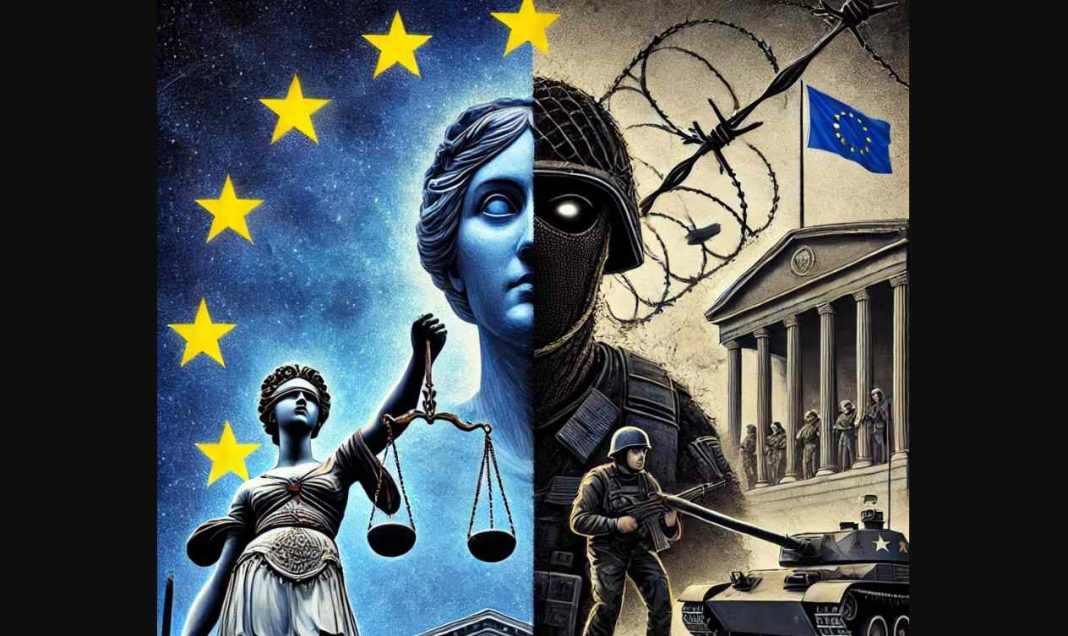The European Union (EU) has sharply criticized Pakistan’s recent military court verdicts sentencing 25 civilians to imprisonment for their alleged involvement in the May 9 riots. The EU statement, issued by its European External Action Service, expressed that these verdicts contradict Pakistan’s obligations under the International Covenant on Civil and Political Rights (ICCPR), to which the country is a signatory.
The ICCPR’s Article 14 mandates the right to a fair and public trial by an independent, impartial, and competent court, with adequate legal representation for the accused. Additionally, it requires that judgments in criminal cases be made public. According to the EU, the military trials violate these fundamental guarantees.
The development also casts a shadow over Pakistan’s commitment to the EU’s Generalised Scheme of Preferences Plus (GSP+), under which Pakistan enjoys trade benefits conditional on implementing 27 core international conventions, including the ICCPR.
Military Court Sentences and Political Reactions
The sentences, ranging from two to ten years of rigorous imprisonment, were handed down to civilians accused of attacking military installations during nationwide protests on May 9, 2023. According to Pakistan’s Inter-Services Public Relations (ISPR), these protests marked a “dark chapter” in the country’s history, with politically orchestrated violence targeting key military sites such as the General Headquarters (GHQ) and Jinnah House.
The military justified the sentences as a necessary measure to address what it described as “political terrorism,” emphasizing the need to deter such acts in the future. The ISPR called the convictions an “important milestone” in ensuring justice and a warning to those who exploit political propaganda for violent ends.
Read More: Modi Strengthens India Kuwait Ties During Historic Visit
However, opposition voices have fiercely condemned these verdicts. Pakistan Tehreek-e-Insaf (PTI) leaders, including Omar Ayub and Asad Qaiser, labeled the military trials as unconstitutional and unjust. Ayub argued that military courts lack jurisdiction over civilians, describing them as “kangaroo courts” that undermine judicial independence and the separation of powers. Qaiser echoed these concerns, calling the trials a violation of fundamental human rights and a failure to meet international standards of justice.
Implications for Pakistan’s International Standing
The EU’s statement adds to the mounting international scrutiny of Pakistan’s use of military courts for trying civilians. Under its GSP+ agreement, Pakistan has committed to upholding international human rights standards. Any perceived violations risk jeopardizing its trade privileges with the EU, a significant economic lifeline.
Critics argue that the military trials reflect a deeper erosion of democratic norms in Pakistan. Legal experts and human rights activists have long cautioned against the expansion of military jurisdiction over civilians, warning that such measures undermine civilian supremacy and the rule of law.
Former Supreme Court Justice Rana Bhagwandas once remarked that military courts, by their very nature, lack the transparency and independence necessary for fair trials. His warnings now resonate as Pakistan faces a growing legitimacy crisis over its handling of the May 9 incidents.
Broader Consequences for Civil-Military Relations
The controversy surrounding the military court verdicts is emblematic of Pakistan’s ongoing struggle with civil-military relations. The trials have further polarized the political landscape, with PTI and other opposition groups accusing the military establishment of using the May 9 protests as a pretext to stifle dissent.
For the EU, the issue is not just a matter of human rights but also a test of Pakistan’s commitment to its international obligations. As Pakistan navigates the fallout from these trials, it faces a stark choice: uphold the rule of law and democratic principles or risk further isolation on the global stage.
The EU’s criticism underscores the broader implications of these verdicts, not just for the individuals sentenced but for Pakistan’s political future and international reputation. With the threat of losing GSP+ privileges looming, the government must decide whether it will prioritize accountability to its citizens or compliance with external pressures.














